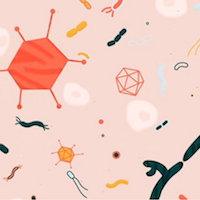Microbiome and Nutrition
The complex community of bacteria, yeasts and viruses living in our intestines, collectively known as the gut microbiome, is shaped, in part, by what we eat. Genetics, environment, and other factors also influence an individual’s microbial community. Research at the NRI investigates these complex relationships and their impact on disease risk. We use animal models and bioinformatics to study the associations between nutritional metabolites, gut microbiome, and health. What happens in the gut doesn’t stay in the gut. Your microbiome can play a role in cardiovascular disease, obesity and diabetes, and even cancer. Our team envisions a future where analysis of your microbiome can determine disease risk, and medical foods can be prescribed to treat and prevent disease by regulating the microbiome.
Publications
Microbiome and Nutrition Publications
2020
Population studies of TMAO and its precursors may help elucidate mechanisms. Meyer K
2019
Association of dietary patterns with the gut microbiota in older, community-dwelling men. Meyer K
2018
Meta-analysis of human genome-microbiome association studies: the MiBioGen consortium initiative. Meyer K
Human microbiota, blood group antigens, and disease. Sumner S
2017
Trimethylamine N-Oxide, the Microbiome, and Heart and Kidney Disease. Zeisel S
2016
Diet and Gut Microbial Function in Metabolic and Cardiovascular Disease Risk. Meyer K
Antibiotic-mediated gut microbiome perturbation accelerates development of type 1 diabetes in mice. Sumner S
Related News
NRI seeks volunteers to help make research discoveries
June 3, 2019 -The UNC Nutrition Research Institute (NRI) in Kannapolis, North Carolina is looking for volunteers to help move science forward. The NRI’s mission is to advance the field of precision nutrition by investigating how genetics, gut microbiota, and environment affect an individual’s requirements for and responses to nutrients. To that end, several NRI principal investigators are currently recruiting participants for their clinical studies.
Chinese herb may be a natural method of treating diabetes
May 31, 2019 – The traditional Chinese herb Lycii Cortex (LyC), with its powerful compound kukoamine B, could be an effective nutraceutical choice for lowering blood glucose when used alone or in combination with low doses of first-line diabetes medications.
The DNA Diet: How knowing your genes can help you fit into your jeans
May 28, 2019 – Most people have this basic understanding of genetics: You inherit genes from your parents, and their DNA combines to create your unique genetic makeup. This can include more obvious traits such as eye color and height but also more complex traits that may involve multiple genes, such as risk of diseases including diabetes, heart disease, obesity and cancer, as well as all aspects of metabolism.
Zeisel receives AICR’s Distinguished Service Award
May 20, 2019 – Steven Zeisel, MD, PhD, professor in the Department of Nutrition at the UNC Gillings School of Global Public Health and director of the UNC Nutrition Research Institute in Kannapolis, N.C., was awarded the American Institute for Cancer Research’s (AICR) Distinguished Service Award at the institute’s annual meeting May 16, 2019.
Sign-up for an NRI Summer Tour
May 20, 2019 – See where and learn how scientific discovery takes place by touring two facilities on the NC Research Campus in Kannapolis: the UNC Nutrition Research Institute and the NCSU Plants for Human Health Institute. Register today!
Studies Explore Mechanisms Behind Obesity-Cancer Link
May 20, 2019 – Research findings presented at the American Association for Cancer Research Annual Meeting 2019 explore possible reasons for obesity-related resistance to breast cancer treatment and possible strategies to overcome obesity-related immune suppression in cancer.







